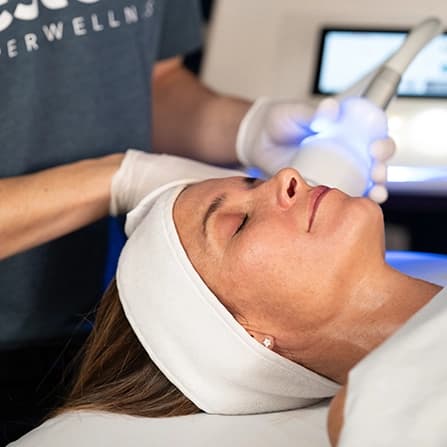Autophagy is like your body's personal cleanup crew, working tirelessly to keep cells healthy and functioning well. This process, which literally means 'self-eating,' helps cells recycle damaged parts and maintain balance. As we learn more about autophagy, we see its importance not just for our cellular health, but also for longevity and disease prevention. Let’s take a closer look at what autophagy is, how it works, and why it matters to our overall health.
Key Takeaways
- Autophagy is essential for cellular maintenance, recycling damaged components for energy and new cell structures.
- This process plays a significant role in promoting longevity by keeping cells in good shape as we age.
- Autophagy helps prevent diseases by removing harmful proteins and dysfunctional organelles from cells.
- Lifestyle choices like fasting and regular exercise can enhance autophagy, contributing to better health.
- Different types of autophagy, such as macroautophagy and microautophagy, serve specific functions in cellular cleanup.
Understanding Autophagy and Its Origins
The Definition of Autophagy
Autophagy, which comes from Greek words meaning "self-eating," is basically your body's way of cleaning house at the cellular level. It's how your cells get rid of damaged parts and make room for new, healthy ones. Think of it as a cellular recycling program. It's like having a built-in maintenance crew that keeps everything running smoothly. This process is essential for cellular rejuvenation and overall health.
Historical Context and Discoveries
The idea of autophagy isn't new; scientists have been studying it since the 1960s. But it really took off when Yoshinori Ohsumi won the Nobel Prize in 2016 for figuring out how it works. His research showed how important this process is for preventing diseases like cancer and brain disorders. Initially, autophagy was observed in yeast cells, but researchers soon realized that it happens in all living things. It's a fundamental process for survival.
The Mechanism of Autophagy
Autophagy works through a series of steps. Here's a simplified breakdown:
- First, something triggers it, like not enough nutrients or cellular stress.
- Then, a structure called a phagophore forms around the stuff that needs to be cleaned up.
- This phagophore turns into an autophagosome, which is like a little garbage bag.
- The autophagosome merges with a lysosome, which contains enzymes that break down the waste.
- Finally, the broken-down parts are recycled back into the cell to be used for energy or to build new things.
Autophagy is a natural process that helps cells survive when they're under stress. It breaks down non-essential components into energy sources and recycles cellular waste materials so the cell can reuse them. It's a pretty neat system that keeps our cells healthy and functioning properly.
The Process of Autophagy Across the Body
Autophagy isn't just some abstract concept; it's a real, ongoing process happening in your body right now. Think of it as your internal sanitation department, constantly working to keep things clean and efficient at the cellular level. It's like having a tiny, tireless crew maintaining our well-being.
Cellular Cleanup Mechanism
Autophagy acts as a cellular recycling program. When a cell is stressed or damaged, autophagy kicks in to break down and remove the dysfunctional components. This includes things like misfolded proteins, damaged organelles (like mitochondria), and invading pathogens. The cell then recycles the resulting building blocks to create new, healthy components. It's a pretty neat system!
Role in Energy Production
Autophagy isn't just about cleaning up; it's also about resource management. When cells are starved of nutrients, autophagy can break down non-essential components to provide the cell with the energy it needs to survive. This is especially important during times of fasting or intense exercise. It's like the cell is saying, "Okay, we're running low on fuel, let's see what we can recycle to keep the lights on."
Impact on Cellular Health
Autophagy plays a vital role in maintaining overall cellular health. By removing damaged components and providing energy during times of stress, it helps cells function optimally and resist disease. When autophagy is impaired, damaged components can accumulate, leading to cellular dysfunction and potentially contributing to age-related diseases. Think of it as preventative maintenance for your cells, keeping them running smoothly for longer. Here are some benefits:
- Reduced risk of cellular damage
- Improved cellular function
- Increased cellular lifespan
Autophagy is a critical process for maintaining cellular health and preventing disease. It's like having a built-in quality control system that ensures your cells are functioning at their best.
Why Care About Autophagy?
Autophagy is like your body's internal recycling program. It's easy to overlook, but it's always working to keep you healthy. Think of it as the cellular cleanup crew, constantly removing damaged parts and making way for new, healthy components. But why should you care about this process?
Cellular Rejuvenation
Autophagy helps rejuvenate your cells by clearing out the old and damaged components. It's like hitting a reset button for your cells, allowing them to function more efficiently. This process is essential for maintaining cellular health and resilience. It's not just about getting rid of the bad stuff; it's about creating space for the good stuff to thrive. Think of it as decluttering your house – once you get rid of the junk, everything runs more smoothly. This cellular rejuvenation process keeps your cells in top shape.
Longevity Benefits
Want to live a longer, healthier life? Autophagy might be a key player. Studies suggest that boosting autophagy can contribute to longevity and healthier aging. It's like giving your cells a regular tune-up, ensuring they stay in optimal condition as you age. By keeping things running smoothly inside your cells, autophagy may slow down the aging process and help prevent age-related diseases. It's not a magic bullet, but it's a significant factor in promoting a long and healthy life. It's about maintaining the quality of your cells over time, which translates to a better quality of life as you get older.
Disease Prevention
Autophagy plays a crucial role in preventing various diseases. When autophagy isn't working correctly, damaged proteins and organelles can accumulate, leading to cellular dysfunction and disease. By removing these harmful components, autophagy helps protect against neurodegenerative disorders, metabolic diseases, and even cancer. It's like having an internal defense system that keeps your cells healthy and functioning properly. Autophagy assists in warding off ailments like Alzheimer's and type 2 diabetes by purging the body of potentially detrimental proteins. It's a continuous process that helps maintain cellular health and prevent the onset of disease.
Autophagy is essential for maintaining cellular quality control. By breaking down defective components within a cell, autophagy prevents their accumulation, which can lead to cellular dysfunction and disease. It is also essential for cellular survival during nutrient deprivation, as it recycles unnecessary or dysfunctional components to provide essential building blocks and energy.
The Role of Autophagy in Disease Prevention
Autophagy is like your body's internal recycling program, and it's a big deal when it comes to staying healthy. It's all about cleaning up the cellular mess, and when it works right, it can help keep a bunch of diseases at bay. Think of it as a tiny, tireless worker constantly removing damaged parts and keeping everything running smoothly. Autophagy is essential in maintaining our health, as it helps eliminate harmful proteins and microbes from our system.
Fighting Neurodegenerative Disorders
One of the coolest things autophagy does is protect your brain. Diseases like Alzheimer's and Parkinson's are often linked to a buildup of bad proteins. Autophagy steps in to clear out those proteins, acting like a garbage disposal for your brain cells. By removing these potentially harmful substances, it helps keep your brain healthy and functioning properly. It's like giving your brain a regular spring cleaning to prevent things from going haywire. This meticulous purging process is essential in preserving the well-being of cells and averting ailments linked to protein clumps, like Alzheimer's or Parkinson's.
Regulating Metabolic Health
Autophagy also plays a role in keeping your metabolism in check. It helps remove damaged mitochondria, which are like the power plants of your cells. When these mitochondria get old or broken, they can cause problems. Autophagy gets rid of them, making way for new, healthy ones. This process is important for preventing metabolic disorders like type 2 diabetes. It's like swapping out an old, inefficient engine for a brand new one, keeping your body running smoothly.
Eliminating Toxic Proteins
Beyond just neurodegenerative diseases, autophagy is a general defender against all sorts of toxic proteins. These proteins can cause damage and inflammation throughout the body. Autophagy targets specifically misfolded, oxidized, mutated, and glycated proteins that can harm cells if left unchecked. By getting rid of these proteins, autophagy helps prevent a wide range of health problems. It's like having a security system that identifies and removes threats before they can cause any real damage.
Autophagy is a fundamental cellular process that plays a multifaceted role in maintaining health and preventing disease. By managing cellular waste, responding to stress, and aiding in survival during times of nutrient scarcity, autophagy is essential for cellular and overall physiological balance.
Enhancing Autophagy Through Lifestyle Choices
Autophagy is like your body's internal cleanup crew, and guess what? You can totally help it do its job better! It's not about crazy diets or insane workouts. Simple changes to your daily life can really boost this process. Let's look at some easy ways to get your cells tidying up.
The Benefits of Fasting
Fasting isn't just some trend; it's a legit way to kickstart autophagy. When you go without food for a bit, your body starts looking for other energy sources, and that's when it starts cleaning house. Think of it like this: when the fridge is empty, you finally get around to cleaning out the pantry.
- Intermittent Fasting: Try eating all your meals within an 8-hour window each day. For example, eat between 12 pm and 8 pm, and then fast for the other 16 hours.
- Time-Restricted Eating: Similar to intermittent fasting, but you might adjust the eating window to fit your schedule.
- Longer Fasts: Some people do 24-hour fasts once or twice a week, but it's best to check with a doctor before trying this.
Fasting gives your cells a break from constantly processing food, which allows them to focus on repair and maintenance. It's like giving your internal machinery a well-deserved vacation, so it can come back stronger and more efficient.
Exercise and Autophagy
Exercise isn't just good for your muscles; it's great for your cells too! When you work out, you put your body under a little bit of stress, and that stress can actually trigger autophagy. It's like telling your cells, "Hey, time to get stronger and cleaner!" Plus, it helps with metabolic health.
- Cardio: Running, swimming, biking – anything that gets your heart pumping.
- Strength Training: Lifting weights or doing bodyweight exercises.
- High-Intensity Interval Training (HIIT): Short bursts of intense exercise followed by rest periods.
Nutritional Support for Autophagy
What you eat matters! Certain foods and nutrients can give autophagy a helping hand. It's all about fueling your body with the right stuff to support its natural cleaning processes. Think of it as providing the cleaning crew with the right tools for the job.
- Spermidine: This compound is found in foods like aged cheese, mushrooms, and soy products. Some studies suggest it can directly activate autophagy.
- Resveratrol: Found in grapes, berries, and red wine, resveratrol is an antioxidant that may also boost autophagy.
- Curcumin: This is the active ingredient in turmeric, and it has anti-inflammatory and antioxidant properties that could support autophagy. You can find Parkinson's supplements with it.
Role of Autophagy in Organs
Think of autophagy as your body's personal cleanup crew, working inside each organ to keep things running smoothly. It's not just a general process; it plays specific and important roles in different parts of your body.
Brain Health
Autophagy is super important for keeping your brain healthy. It helps get rid of misfolded proteins and damaged cell parts that can lead to problems like Parkinson's and Alzheimer's disease. This cleanup process protects brain cells from damage caused by aging, toxins, and those nasty neurodegenerative diseases. Studies show that when autophagy isn't working right, it can lead to cognitive decline, which highlights how important it is for keeping your brain in good shape. It's like giving your brain a regular spring cleaning to keep it sharp.
Muscle Maintenance
To keep your muscles strong and working well, autophagy steps in to remove any malfunctioning mitochondria. This is a big deal for muscle maintenance and repair because it helps keep your muscles healthy and provides the resources they need to regenerate. When autophagy is working efficiently, it can improve your exercise performance and speed up recovery by making sure your muscles have enough energy and protein turnover. Plus, it's key for preventing muscle-wasting conditions like sarcopenia, which often comes with aging or inactivity. Think of it as your muscles' personal trainer, ensuring they stay in top condition. You can explore longevity science to learn more about how to maintain muscle mass as you age.
Immune System Function
Autophagy plays a vital role in the immune system by removing pathogens and cellular debris. This process is essential for maintaining a healthy immune response and preventing autoimmune diseases. Autophagy helps immune cells recognize and eliminate threats, ensuring the immune system functions effectively. Without proper autophagy, the immune system can become compromised, leading to increased susceptibility to infections and chronic inflammation. It's like having a security system that identifies and eliminates threats to keep your body safe.
Autophagy is like the body's recycling program. It breaks down old, damaged cell parts and reuses them to build new ones. This process is essential for keeping our organs healthy and functioning properly. When autophagy isn't working right, it can lead to a variety of health problems, including neurodegenerative diseases, muscle wasting, and immune dysfunction.
What Kind of Autophagy Can Be Induced?
So, you're probably wondering, what kinds of autophagy are there? Well, it's not just one-size-fits-all. There are a few different types, each with its own way of cleaning up the cellular mess. Let's break them down.
Macroautophagy
Think of macroautophagy as the cell's main recycling program. It's like the big garbage truck that comes around and picks up all the bulky waste. This process involves forming double-membrane vesicles called autophagosomes. These autophagosomes engulf damaged organelles, misfolded proteins, and other cellular debris. Then, they fuse with lysosomes, which contain enzymes that break down the cargo. The resulting molecules are then recycled back into the cell. It's a pretty efficient system!
Microautophagy
Microautophagy is more like a cellular vacuum cleaner. Instead of using a big autophagosome to engulf large chunks of cellular material, the lysosome itself directly engulfs smaller bits of cytoplasm. It's like the cell is taking little sips of its own interior to get rid of unwanted stuff. This process helps maintain a balanced environment within the cell. It's a bit more direct than macroautophagy.
Chaperone-Mediated Autophagy
Chaperone-mediated autophagy (CMA) is a highly selective process. It's like having a personal assistant that identifies specific proteins marked for degradation. These proteins have a special targeting motif that's recognized by chaperone proteins. The chaperones then escort these proteins to the lysosome for degradation. This ensures that only the damaged or unnecessary proteins are broken down, leaving the rest of the cell's machinery intact. It's a very precise and efficient way to maintain cellular health. This process is vital for neuronal health and overall cellular function.
Autophagy is a complex process, and these different types work together to keep our cells healthy and functioning properly. Understanding these mechanisms can help us appreciate the importance of lifestyle choices that promote autophagy, such as fasting and exercise.
Wrapping It Up
So, there you have it. Autophagy is like your body's personal cleanup crew, working hard to keep everything in check. It helps your cells stay healthy by getting rid of the junk and making sure everything runs smoothly. Plus, it might even help you live longer and fight off diseases. By taking care of your body with good habits like eating right, exercising, and maybe even trying some fasting, you can give autophagy a boost. In the end, understanding and supporting this process could be a game-changer for your health and longevity.
Frequently Asked Questions
What is autophagy?
Autophagy is the process where your body cleans out damaged cells and recycles their parts for energy or to build new cells.
Why is autophagy important?
Autophagy helps keep your cells healthy by removing junk and damaged parts, which can help you live longer and avoid diseases.
How does autophagy work?
When your cells are stressed or low on nutrients, autophagy kicks in to clean up and recycle what they don’t need anymore.
Can I boost autophagy?
Yes! You can enhance autophagy by fasting, exercising regularly, and eating a nutritious diet.
What diseases can autophagy help prevent?
Autophagy can help protect against diseases like Alzheimer’s, diabetes, and other chronic conditions by cleaning out harmful proteins.
Are there different types of autophagy?
Yes, there are three main types: macroautophagy, microautophagy, and chaperone-mediated autophagy, each with its own way of cleaning up the cell.
























